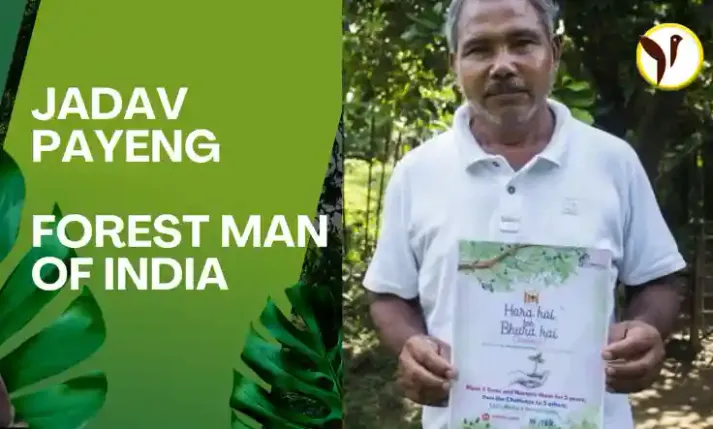“I’ll plant till my last breath.” - Padma Shri Jadav "Molai" Payeng.
Jadav Molai Payeng, a compassionate and genuine individual, was born in 1963 to a Mishing tribe in Assam, India. His parents, who earned a living by selling milk, faced immense poverty. In the aftermath of the devastating 1965 flood that destroyed their native land of Aruna Sapori, Payeng's family had no choice but to relocate to Majuli, on the other side of the Brahmaputra River.
At the tender age of five, Payeng was entrusted to the care of Anil Borthakur, a court master at the District Judge Court in Jorhat, who took charge of his education. In this episode of Jobaaj Stories, we bring to you the story of a man whose extraordinary journey transformed a barren land into a thriving forest.
From Flood-Devastated Sandbar to Thriving Forest
In 1978, after completing his Class X exams, Payeng returned to Aruna Sapori. Witnessing the destruction left by the floods, he was deeply moved. Seeking guidance, he turned to the nearby Deori community village, where he learned about the plight of reptiles. Snakes washed up onto the sandbar during the floods, had perished due to the lack of tree cover. The villagers advised Payeng to grow trees to safeguard these creatures.
Motivated by the villagers' pleas and his own compassion for nature, Payeng dedicated himself to the task. Initially, he worked as a laborer in the developing forest for five years. Even after completing this term, Payeng chose to remain on the sandbar and continued to plant trees single-handedly.
Over four decades, his unwavering efforts transformed the once-barren land into a flourishing forest spanning approximately 1390 acres. In honor of his exceptional contributions, the forest came to be known as the Molai forest.
The Beauty of the Molai Forest
Today, the Molai forest serves as a sanctuary for diverse animals, including Bengal tigers, Indian rhinoceros, deer, rabbits, monkeys, and many bird species, including a significant population of vultures. The forest is home to thousands of trees, including the valcol, arjun, ejar, goldmohur, koroi, moj, and himolu, as well as bamboo that covers an area of more than 300 hectares. It stands as a testament to Payeng's selflessness and dedication to preserving nature.
The Ordinary Man Behind the Amazing Miracles
Payeng's remarkable journey took a significant turn when Jitu Kalita, a wildlife photographer, and journalist from Johrat, discovered his relentless efforts to protect and nurture the environment. Kalita published a story on Payeng in the Assamese newspaper, The Dainik Janambhumi, in 2010, becoming Payeng's mentor and guiding light during challenging times.
The international recognition that followed propelled Payeng's story to the global stage, and in 2015, the late President APJ Abdul Kalam awarded him the Padma Sri Award and a monetary prize in Mumbai. Payeng utilized the funds for the welfare of the villagers in the region.
His incredible achievements have been celebrated through numerous awards and accolades, and he has delivered inspiring TED talks. Payeng's story has also reached younger audiences through a children's book titled, "Jadav and the Tree Place," which chronicles his journey of creating a forest that now thrives with wildlife. Award-winning documentaries have further immortalized his extraordinary endeavors, and the Molai forest has become a sought-after destination for visitors worldwide.
Written by Harshita Kumar
Also Read, Lok Sabha passes the Forest (Conservation) Amendment Bill 2023, land to be used for strategic needs







